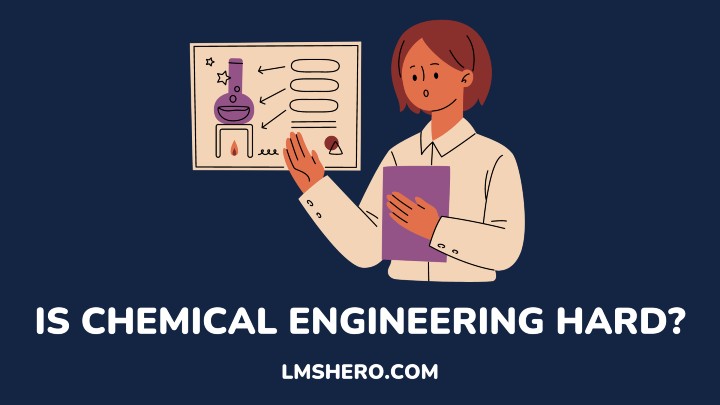Yes, for the average student, chemical engineering is what you would consider a hard course to study.
As a science based on chemistry and mathematics, learning to become a chemical engineer is one of the most challenging degree courses.
This article explores what makes chemical engineering hard, the advantages of becoming a chemical engineer, and the suitable jobs attached to this discipline.
What is chemical engineering?
Chemical engineering refers to the creation and manufacture of products using chemical processes.
This includes creating tools, frameworks, and procedures for processing chemicals, combining, compounding, and refining raw materials.
The field focuses on methods for enhancing production as well as the creation and administration of chemical facilities.
Chemical engineers transform laboratory techniques into real-world applications for the manufacture of goods for sale, and they subsequently work to maintain and enhance those processes.
As a chemical engineering major, you will rely on mathematics, chemistry, and physics, which are the three basic pillars of chemical engineering. However, biology is also becoming a significant aspect of this field.
How hard is chemical engineering?
Chemical engineering is a challenging course to study. It’s a field that calls for the capacity to learn and think using a wide range of quite diverse frameworks and fundamental talents.
It’s among the few fields where knowledge of how microscopic interactions lead to intermediate processes that produce enormous results is necessary.
To comprehend microscopic, mesoscopic, and macroscopic processes, entire various fields of study have been developed. However, these disciplines hardly ever span all distances and periods as chemical engineering does.
Can you study chemical engineering if you’re not good at math?
Yes, even if your math skills aren’t all that great, you can still become a chemical engineer.
However, you must pass all your mathematics courses, including those that call for a certain level of arithmetic proficiency. You don’t need to be especially talented. You simply need to be proficient enough to pass.
What subjects do you need to be good at to study chemical engineering?
You’ll most certainly require math, chemistry, and physics while applying for the course. A good background in chemistry and mathematics is often required for entry into chemical engineering programs, while knowledge of other sciences is advantageous.

Further mathematics, statistics, design technology, product design, and engineering are some additional disciplines that will be helpful to you.
What jobs can you get with a chemical engineering degree?
As a chemical engineer, you might work on projects that enhance methods for processing food, create clothing made of synthetic fibers, create medicine production processes, or manage environmental issues.
Chemical engineers identify practical, cost-effective, and efficient solutions to issues. Additionally, your degree as a chemical engineer can be helpful in fields like law, instruction, publishing, finance, and medicine.
Other job roles/titles you can take on as a chemical engineering major include the following;
- Plant Process Engineer
- Project Engineer
- Chemical Plant Technical Director
- Teacher or Professor
- Technical Sales Person
- Product Engineer
- Petroleum Engineer
- Chemical Engineer
- Environmental waste manager
- Process Safety Engineer
- Environmental Engineer
- Operations/production
- Material Engineer
- Process Safety Engineer
- Technician
- Regulatory Affairs Engineer
- Process Design Engineer
What are the advantages of studying chemical engineering?
1. Money
Most people consider money to be a major consideration when deciding on a future job. This is no problem with chemical engineering because it is one of the more lucrative engineering specialties.
However, your compensation will be mostly based on how well you perform at your college or your experience in the field.
2. Job Security
Chemical engineers are in constant demand due to their high demand and limited availability. Therefore once employed, you typically have the power to decide whether you will stay at your position or seek out a better offer.
3. Fulfillment
Although working as a chemical engineer allows you to truly make a difference, this may be a more personal advantage.
This includes facilitating the comfort and safety of others. Such a feeling of accomplishment is unquestionably beneficial to your mental health and character buildup.
What are the disadvantages of chemical engineering?
1. Learning difficulty
Learning to become a chemical engineer is undoubtedly challenging, even though it might not be as challenging as becoming a medical doctor or lawyer.
Students must excel in tough subjects like advanced math, physics, and chemistry among other disciplines.
2. Health safety issues
Despite being careful while working with toxic chemicals needed to create a product, accidents are bound to happen. Exposure to such chemicals for a long period can also lead to health complications.
3. Pollution
Many of the reactions you produce have by-products that may have an impact on the environment and can actually accelerate global warming.
Some people might end up being victims of these negative effects and may suffer adverse health issues.
FAQs
Chemical engineering is based on what principles?
Chemical engineering makes efficient use of the concepts of chemistry, physics, math, biology, and economics to create, design, transport, and transform energy and materials.
Where can you get chemical engineering jobs?
You can get chemical engineering jobs in areas like petrochemicals, design and construction, pharmaceutical companies, biotechnology companies, and the plastics industry.
Do chemical engineers conduct research?
Yes, chemical engineers conduct research.
These are common tasks performed by them to develop new and better manufacturing techniques.
Conclusion
While it might offer some challenges as a course, the perks that come with being a chemical engineer are too great to miss. For one, there is a high demand for chemical engineers in the job market and various industries where their services are required.
Most chemical engineering jobs offer good pay and job security. You are also not limited to a certain industry as candidates can cut across numerous production or environmental institutions.
However, people who wish to become chemical engineers should know that it requires knowledge of math and chemistry. While you don’t need to be a guru in these subjects, you should at least be able to understand and pass exams on these courses.
I hope you found this article helpful. You can also read about the possibilities of becoming an engineer without a degree.
Thanks for reading.






